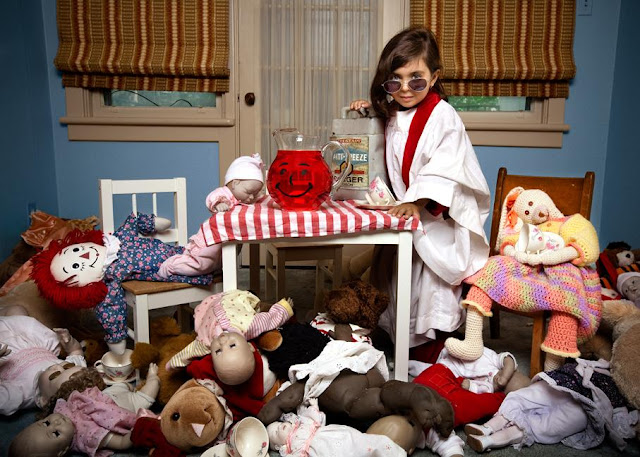Almost a decade after the Abu Ghraib prisoner abuse story
first came to public attention, the photographs are still a topic of
much controversy. One photographer however has flipped the controversy
on its head and made them the inspiration for his portraiture series
featuring children, and then some. Jonathan Hobin
entered the spotlight a few years ago when his images were deemed just
as controversial as the original images from which he based his "In The Playroom" series.
Jonathan Hobin is an artist and
director who works primarily with photographs. He has done extensive
work from portraiture to commercial and editorial photography. His work
draws inspiration from popular culture, but reinvents them into a darker
interpretation, especially when involving childhood themes.
Hobbin reached viral popularity when his 2010 project "In the Playroom" was
picked up by different online news outlets and blogs. The project
depicts children dressed in adult clothes reenacting some of the most
tragic moments in popular history. Many news organizations commented on the controversial nature of the project which involved disturbing scenes, juxtaposed with children posing in a scene which they may have no idea about.
Hobin's images are staged to resemble some of the most popular news
stories in the last half-century, including references to the 1978 Jonestown Massacre, the accidental death of Princess Diana, the Abu Ghraib prison tortures,
and the 9/11 attacks. Most of these scenes make use of
toys, Halloween props or other items commonly found in a children's
room. While some have condemned this seemingly lighthearted take on some
of the world's most awful tragedies, a few others have praised the cultural impact of these reenactments. One thing that both sides agree on is the obscurity of the artist's purpose for these images.
What exactly is the point of these controversial photographs? In Hobin's own words, he wants "people to acknowledge the fact that kids see the scariest things that are out there. The fact that children are like sponges and soak up everything around them is an interesting thing to think about since so much violence and issues within society are televised on a daily basis."
What exactly is the point of these controversial photographs? In Hobin's own words, he wants "people to acknowledge the fact that kids see the scariest things that are out there. The fact that children are like sponges and soak up everything around them is an interesting thing to think about since so much violence and issues within society are televised on a daily basis."
It's true that children might not be able to understand the tremendous
impact of these historic events. While adults count the deaths and
damages involved in each story, children might only look at the images
without paying attention to the context, if ever they watch the news
long enough to take in the scene.
Hobin insists that his photographs are "a metaphor for the impossibility of a protective space safe from the reach of modern media." However, instead of inviting viewers to reflect on the impact of today's media on the "tabula rasa" state of children, he may have inadvertently created a controversy that overshadows his good intentions.
Hobin insists that his photographs are "a metaphor for the impossibility of a protective space safe from the reach of modern media." However, instead of inviting viewers to reflect on the impact of today's media on the "tabula rasa" state of children, he may have inadvertently created a controversy that overshadows his good intentions.
Jonathan Hobin's website has the complete series "In The Playroom". They're also on his Facebook fanpage. For an overview of how some of this generation's most controversial photographs have impacted the public, take a look at the Abu Ghraib prison torture and abuse story.








